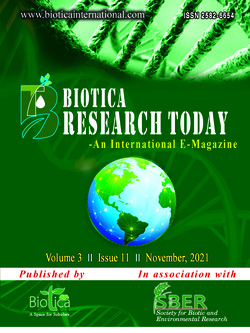
Bioremediation of Polluted Environment
Devadharshini K.P.
Dept. of Environmental Sciences, Tamil Nadu Agricultural University, Tamil Nadu (641 003), India
E. Parameswari*
Dept. of Environmental Sciences, Tamil Nadu Agricultural University, Tamil Nadu (641 003), India
M. Maheswari
Dept. of Environmental Sciences, Tamil Nadu Agricultural University, Tamil Nadu (641 003), India
DOI: NIL
Keywords: Bioremediation, Environmental factors, Microbes, Principles
Abstract
Understanding the bioremediation process which is central to the future of widespread exploitation of microorganisms to reduce the environmental burden of toxic substances is vital and more essential. This paper explains about the principles of bioremediation, its application and types for a better understanding. It also explains about the microbial populations and its role during the bioremediation process. Environmental parameters like nutrient, temperature and moisture content are required in necessary levels, along with the tabulation which elaborated the detailed information about the required parameters in the suitable bioremediation process. And finally the conclusion gives clear cut explanation about the bioremediation which is derived from its advantages and disadvantages.
Downloads
not found
Reference
Adams, G.O., Fufeyin, P.T., Okoro, S.E., Ehinomen, I., 2015. Bioremediation, biostimulation and bioaugmention: a review. International Journal of Environmental Bioremediation & Biodegradation 3(1), 28-39.
Ojuederie, O.B., Babalola, O.O., 2017. Microbial and plant-assisted bioremediation of heavy metal polluted environments: a review. International Journal of Environmental Research and Public Health 14(12), 1504.
Parameswari, E., 2009. Impact of agricultural drainage water on crops under sequential biological concentration system and use of nanoparticles for wastewater treatment (Doctoral dissertation, Ph D Thesis). Tamil Nadu Agricultural University, Coimbatore, India, p. 177.
